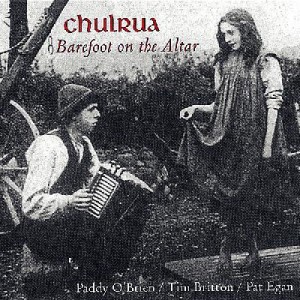 Naomi de Bruyn penned this review.
Naomi de Bruyn penned this review.
Chulrua (pronounced cool-ROO-ah) is not only the name of this amazing trio of celebrated musicians but the name of the favourite wolfhound of the ancient Irish hero Fionn MacCumhaill. It translates to English as “red back.” Personally, I love how traditional Irish music is infused with so much history; it adds a depth and richness which makes it even more enjoyable.
The members of this trio are Paddy O’Brien (button accordion), Pat Egan (guitar, vocals), and Tim Britton (uillean pipes, wooden flute, whistle). Together they play the old instrumental dance music of Ireland, as well as walking marches, slow airs, etc. They present it as if they were in a traditional session, which can be held anywhere but is best in small and intimate settings. This music is something the trio strive to present in keeping with the old tradition, passed from generation to generation. The group also do teaching workshops, and school residencies, and play a wide range of venues.
Barefoot on the Altar gives us a sampling of all aspects of Irish music, from jigs to airs. All are played with a skill and passion that make the music itself seem as if it were a living entity. The majority of the 17 tracks are traditional; the entire 70 minutes are a journey to another time, another style of life.
“The Foggy Dew” is perhaps an older harp tune, according to the liner notes. The lyrics were supplied by Peadar Kearney, who composed the Irish national anthem. It is a song lamenting the loss of so many Irishmen to WWI, and points out that they might have been much more valuable fighting at home. “It was better to die beneath an Irish sky…” War is always a sad affair, and this song holds the mournful wail of mothers, wives, and daughters, and all who lost their loved ones.
“Springhill Mine Disaster” was written by Peggy Seeger as a tribute to a tragic event in the coal-mining town of Springhill, Nova Scotia in 1958. Underscoring the terrible price of coal often paid by miners and by their families, the song describes a major “bump” (cave-in) in 1958 which killed 75 men. Some miners were rescued, but the price was a horrible one to pay. “There’s blood and bone for miners lives, and roads that never see sun or sky/ …through all their days, they dug their graves…”
Another track which I readily enjoyed and is not so dark and tragic, is “Slip Jigs: The Whinny Hills of Leitrim/The Arragh Mountains.” We are treated to two different versions of “The Whinny Hills of Leitrim,” the second version played in two different keys. The third piece, according to the liner notes, was composed by Paddy O’Brien, the box player of Newton, Co., Tipperary, who recorded it with fiddle maestro Seamus Connolly of Killaloe, Co., Clare, on an album called The Banks of the Shannon.
This is a perfect CD for a quiet day where you wish to indulge yourself. It was recorded live, and there has been no overdubbing, mixing, or other artificial enhancement or modifications. As the cover notes state: “In stark contrast to modern recording trends, this approach renders the music as it is, in all its vulnerability, intimacy, and raw power. We feel this best serves the music as we know and love it.” And it is music to love!
(Self-released, 1999)
